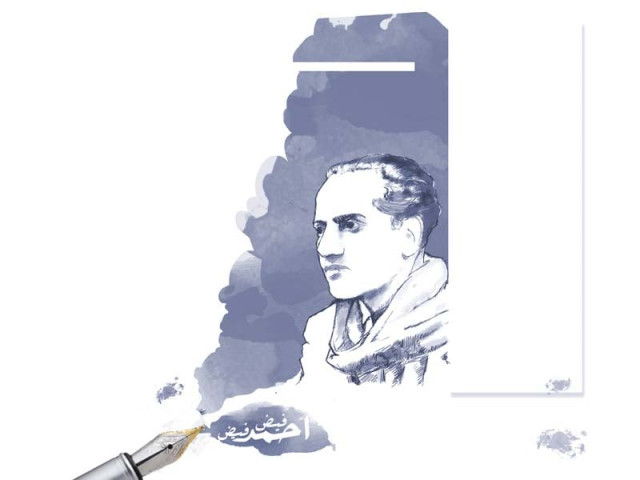Faiz Ahmed Faiz (1911-1984): The poet of commitment
It appears as if Faiz is still present among us, his towering personality dominating everything

ILLUSTRATION: JAMAL KHURSHID
LAYOUT DESIGN: EESHA AZAM
Faiz Ahmed Faiz was one of the few people who became legends in their own lifetime. Although it is increasingly difficult to probe into the causes of his widespread popularity, one can say for sure that the creative element in his personality was of a nature exclusive in its own right.
There are some who attribute Faiz’s fame to his political, progressive learnings and also to his imprisonment and trial of the, so called, Rawalpindi Conspiracy case. This is nothing but hearsay. Fortunately, I have had the opportunity to meet Faiz more than once, at literary gatherings and in the loneliness of his Karachi residence. He was a very conscious and an extremely well-read man, who despite his preoccupations and creative activities, was never forgetful or careless.
Faiz was undoubtedly a trendsetter in his own right who gave birth to a new style of Urdu poetry through his intellectual pursuits. He himself states:
Hum ne jo tarz-e-fughan ki hai qafas mein ejaad,
Faiz gulshan mein wohi tarz-e-bayaan thehri hai!
(The style of expressing sorrows that we invented in prison,
Has become the poetic style of the day!)
In Memoriam: Jaun Elia, the defeatist who won us over
During my several meetings with him, not once did I see Faiz dismayed. Despite the odds and vicissitudes of his life, he remained an ardent poet, committed to his ideology and values. I recollect only one occasion when he lost his temper. During the years of the language issue, I remember him saying to a large gathering, “We want to make Urdu the language of the entire Pakistan and you want to confine it to Lalukhet?”
The separation of East Pakistan had a profound impact on him. One day, after a long gap, I went to see him and he handed me a poem that he had penned. It began with the following lines:
Sajay to kese sajay qatl-e-aam ka mela
Kisey lubhayega mere lahu ka vaavela
Certain elements in Karachi at that time were forcing Faiz to return the Lenin Peace Prize and protest to the Soviet Union since they believed the Russian administration was involved in the 1971 war. Faiz mooted the issue with clarity of thought at a large gathering at Theosophical Hall and refused to surrender the prize, saying it was not given by any individual and carried the title of peace.
Faiz International Festival kicks off in Lahore on November 19
His time in Beirut was devoted to the Palestinian cause and was also, incidentally, the spring season of his poetic pursuits. He wrote a large number of his poems, included in Sar-e-Wadi-e-Sina and Meray Dil, Meray Musafir, in the Lebanese capital. While in Beirut, Faiz edited Lotus magazine, which carried numerous of his poetic writings and remarkable editorials.
Once Mirza Zafarul Hasan, the secretary of Idara-e-Yadgar-e-Ghalib, and I suggested to Faiz to translate into Urdu the letters he wrote to his wife Alys during his days behind bars. He gave in to our demands and every Sunday morning, both of us would visit Faiz and go through the translation drafts that he had inked. The collection was printed under the title Saleebain Mere Dareeche Main.
Faiz was well-acquainted with the problems of his people and issues of global importance. His poetry, with a subtle aesthetic touch, mirrored human issues, the quest for peace and a sense of values. Apart from being loved by literary circles, he is extremely popular among those associated with performing arts. It is awe-inspiring to see that events were put together in around 140 cities of the world to pay tribute to Faiz’s poetry of commitment at the occasion of centenary.
In memoriam: Of romance, resistance and lost medals
It appears as if, like his lifetime, he is still present among us, his towering personality dominating everything. There is a couplet that he composed during the last phase of his life that moves me every time I read it:
Johri band kiye dete hen bazaar-e-sukhan,
Hum kahan bechne almaas-o-gohar jaen ge?
(Jewellers are closing down the shops of discourse,
Where will we go sell our rubies and diamonds?)
The writer is a noted critic and scholar of Urdu literature. He is a former chairperson of the Karachi University Urdu department
Published in The Express Tribune, November 15th, 2015.
Like Life & Style on Facebook, follow @ETLifeandStyle on Twitter for the latest in fashion, gossip and entertainment.



















COMMENTS
Comments are moderated and generally will be posted if they are on-topic and not abusive.
For more information, please see our Comments FAQ